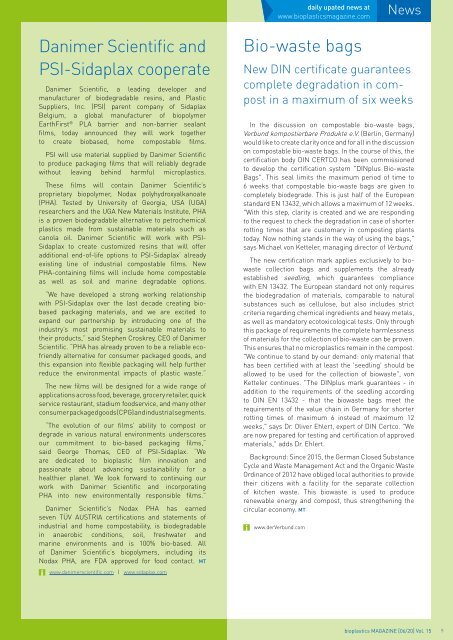Issue 06/2020
Highlights: Films / Flexibles Bioplastics from waste-streams Basics: Eutrophication
Highlights:
Films / Flexibles
Bioplastics from waste-streams
Basics: Eutrophication
Create successful ePaper yourself
Turn your PDF publications into a flip-book with our unique Google optimized e-Paper software.
daily upated news at<br />
www.bioplasticsmagazine.com<br />
News<br />
Danimer Scientific and<br />
PSI-Sidaplax cooperate<br />
Danimer Scientific, a leading developer and<br />
manufacturer of biodegradable resins, and Plastic<br />
Suppliers, Inc. (PSI) parent company of Sidaplax<br />
Belgium, a global manufacturer of biopolymer<br />
EarthFirst ® PLA barrier and non-barrier sealant<br />
films, today announced they will work together<br />
to create biobased, home compostable films.<br />
PSI will use material supplied by Danimer Scientific<br />
to produce packaging films that will reliably degrade<br />
without leaving behind harmful microplastics.<br />
These films will contain Danimer Scientific’s<br />
proprietary biopolymer, Nodax polyhydroxyalkanoate<br />
(PHA). Tested by University of Georgia, USA (UGA)<br />
researchers and the UGA New Materials Institute, PHA<br />
is a proven biodegradable alternative to petrochemical<br />
plastics made from sustainable materials such as<br />
canola oil. Danimer Scientific will work with PSI-<br />
Sidaplax to create customized resins that will offer<br />
additional end-of-life options to PSI-Sidaplax’ already<br />
existing line of industrial compostable films. New<br />
PHA-containing films will include home compostable<br />
as well as soil and marine degradable options.<br />
“We have developed a strong working relationship<br />
with PSI-Sidaplax over the last decade creating biobased<br />
packaging materials, and we are excited to<br />
expand our partnership by introducing one of the<br />
industry’s most promising sustainable materials to<br />
their products,” said Stephen Croskrey, CEO of Danimer<br />
Scientific. “PHA has already proven to be a reliable ecofriendly<br />
alternative for consumer packaged goods, and<br />
this expansion into flexible packaging will help further<br />
reduce the environmental impacts of plastic waste.”<br />
The new films will be designed for a wide range of<br />
applications across food, beverage, grocery retailer, quick<br />
service restaurant, stadium foodservice, and many other<br />
consumer packaged goods (CPG) and industrial segments.<br />
“The evolution of our films’ ability to compost or<br />
degrade in various natural environments underscores<br />
our commitment to bio-based packaging films,”<br />
said George Thomas, CEO of PSI-Sidaplax. “We<br />
are dedicated to bioplastic film innovation and<br />
passionate about advancing sustainability for a<br />
healthier planet. We look forward to continuing our<br />
work with Danimer Scientific and incorporating<br />
PHA into new environmentally responsible films.”<br />
Danimer Scientific’s Nodax PHA has earned<br />
seven TÜV AUSTRIA certifications and statements of<br />
industrial and home compostability, is biodegradable<br />
in anaerobic conditions, soil, freshwater and<br />
marine environments and is 100% bio-based. All<br />
of Danimer Scientific’s biopolymers, including its<br />
Nodax PHA, are FDA approved for food contact. MT<br />
www.danimerscientific.com | www.sidaplax.com<br />
Bio-waste bags<br />
New DIN certificate guarantees<br />
complete degradation in compost<br />
in a maximum of six weeks<br />
In the discussion on compostable bio-waste bags,<br />
Verbund kompostierbare Produkte e.V. (Berlin, Germany)<br />
would like to create clarity once and for all in the discussion<br />
on compostable bio-waste bags. In the course of this, the<br />
certification body DIN CERTCO has been commissioned<br />
to develop the certification system "DINplus Bio-waste<br />
Bags". This seal limits the maximum period of time to<br />
6 weeks that compostable bio-waste bags are given to<br />
completely biodegrade. This is just half of the European<br />
standard EN 13432, which allows a maximum of 12 weeks.<br />
"With this step, clarity is created and we are responding<br />
to the request to check the degradation in case of shorter<br />
rotting times that are customary in composting plants<br />
today. Now nothing stands in the way of using the bags,"<br />
says Michael von Ketteler, managing director of Verbund.<br />
The new certification mark applies exclusively to biowaste<br />
collection bags and supplements the already<br />
established seedling, which guarantees compliance<br />
with EN 13432. The European standard not only requires<br />
the biodegradation of materials, comparable to natural<br />
substances such as cellulose, but also includes strict<br />
criteria regarding chemical ingredients and heavy metals,<br />
as well as mandatory ecotoxicological tests. Only through<br />
this package of requirements the complete harmlessness<br />
of materials for the collection of bio-waste can be proven.<br />
This ensures that no microplastics remain in the compost.<br />
"We continue to stand by our demand: only material that<br />
has been certified with at least the 'seedling' should be<br />
allowed to be used for the collection of biowaste", von<br />
Ketteler continues. "The DINplus mark guarantees - in<br />
addition to the requirements of the seedling according<br />
to DIN EN 13432 - that the biowaste bags meet the<br />
requirements of the value chain in Germany for shorter<br />
rotting times of maximum 6 instead of maximum 12<br />
weeks," says Dr. Oliver Ehlert, expert of DIN Certco. "We<br />
are now prepared for testing and certification of approved<br />
materials," adds Dr. Ehlert.<br />
Background: Since 2015, the German Closed Substance<br />
Cycle and Waste Management Act and the Organic Waste<br />
Ordinance of 2012 have obliged local authorities to provide<br />
their citizens with a facility for the separate collection<br />
of kitchen waste. This biowaste is used to produce<br />
renewable energy and compost, thus strengthening the<br />
circular economy. MT<br />
www.derVerbund.com<br />
bioplastics MAGAZINE [<strong>06</strong>/20] Vol. 15 9


















